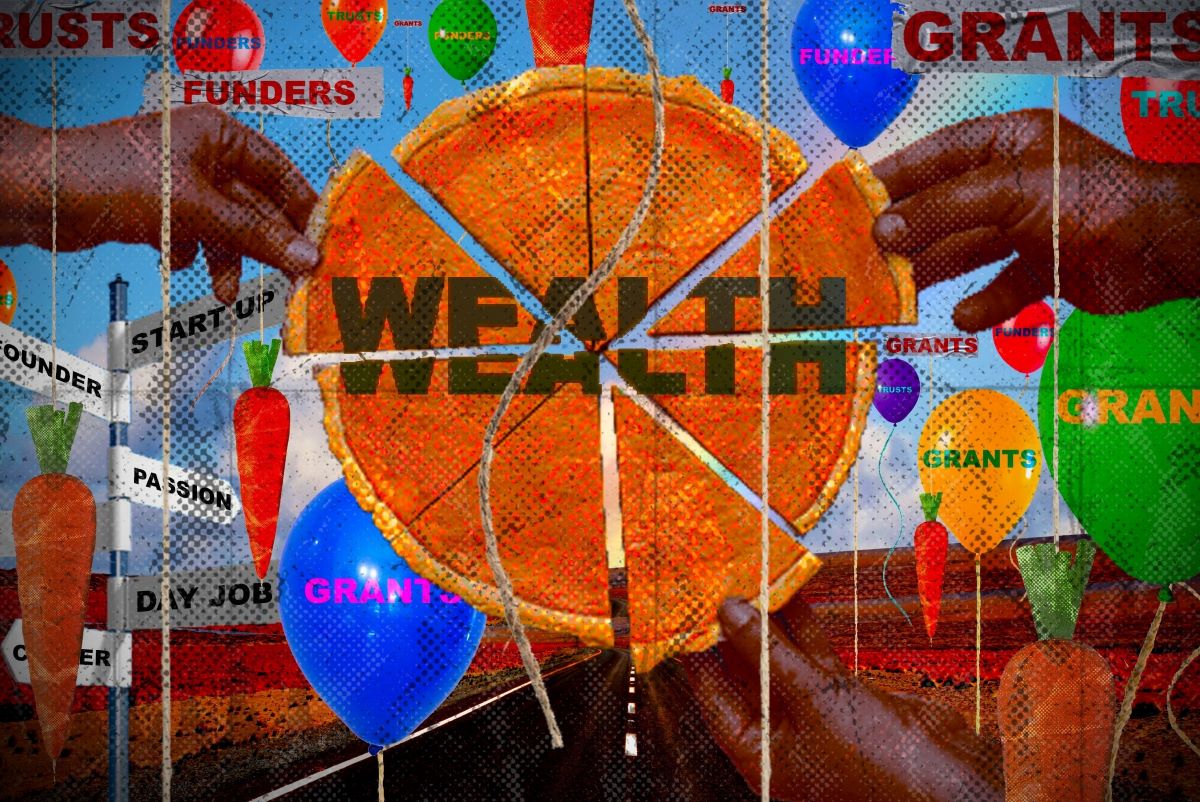
Image by Paul Ayre
Is money a help or hindrance in fulfilling potential?
While not making him rich, Kevin Osborne’s early career earnings in the music industry were enough to allow him career breaks which were important learning opportunities.
They were opportunities to think about how past experiences had shaped me, assess what mattered to me most, and go on to pursue activities that were personally rewarding. It was at these career turning points that I was able to develop and launch various projects over my career.
This financial security also allowed me to try and fail multiple times – each time learning from the last, helping me move closer to achieving my goals and honing my ability to create deeper social impact.
As a founder, if you don’t have a basic underpinning of wealth, typically by owning a home or inheriting property, it is far riskier taking time away from day-to-day work to think deeply about what you really want to do.
The racial wealth gap in the UK means Black founders have less freedom to take time out to develop themselves than their white counterparts, and they must often rely on grants. Grant funding comes with criteria and conditions attached, which frequently do not match with the development needs of Black and Brown founders – either in terms of what they want to do or the way they want the development delivered.
The greater the ability of Black and Brown founders to fund themselves, the more the development happens on their own terms and the better the possibility for them to pursue activities that are most meaningful to them. This autonomy to make important career and life choices is why I now focus my work on individual wealth creation.
However, trying to create wealth in Black communities does leave me conflicted.
My ambivalence
The aim of wealth creation is to allow Black and Brown founders to realise their potential by developing projects which are most meaningful to them. But while money can act as an enabler of potential it is also its biggest inhibitor.
Too often people find it difficult to manage the thin line between having enough money to meet their needs and having enough to meet their aspirations. In people who have experienced racial discrimination this plays out in two ways.
They first strive to meet their basic living costs. For those who achieve this, there often follows a new set of aspirations leading to an improvement in lifestyle. Once established, this new lifestyle becomes difficult to walk away from. Comfort, security, and the fear of losing these, is the enemy of ‘the dream’ and the work that needs to be done.
Secondly, racism (and all forms of exclusion) embeds an emotional need to belong. In a capitalist society, belonging and self-worth can therefore become deeply entangled with financial wealth. Money acts as an unconscious driver and receiving recognition through material wealth then tends to override achieving a deeper sense of identity through pursuit of work that is most meaningful. The dream project either gets postponed or diluted.
While money can act as an enabler of potential it is also its biggest inhibitor.
To truly enable potential, money should not be an end, but a means to an end. However, things easily become entangled. It is likely, when funding wealth creation in Black communities, or any community, that there will be mixed outcomes. Some individuals will use wealth for positive social impact, others will get caught in the aspirational trap, and some will inevitably use the power that comes with wealth negatively. Many will do all of these.
This leaves me conflicted, but I have reached the conclusion that it is only through wealth creation that you open the possibility of Black and Brown communities discovering, for themselves, where their deeper potential lies. So, despite my ambivalence, I continue to advocate for individual wealth creation in Black and Brown communities.
Making wealth distribution happen
The process of wealth distribution can be catalysed with grants both from government through organisations like the British Business Bank, Big Society Capital and Arts Council England and the various trusts and foundations across the UK. It is important these funders give up any sense of moral authority about outcomes, including individual wealth creation.
The racial wealth gap in the UK remains stubbornly high. In 2018-19, two-thirds of Bangladeshi children and nearly half of Black Caribbean children lived in poverty. This gap poses an existential threat in that it fragments society. If people are not rewarded equitably, one outcome is that those left behind either become apathetic or resistant to society and not willing to participate in solutions to the wider threats we face like climate change.
The leaders of government-backed funding bodies have a responsibility to distribute their funding in a racially equitable way. They are the gatekeepers with direct relationship with government. But all too often they act as passive conduits of funding rather than more actively working for racially equitable distribution.
This is an abdication of social responsibility. Their passivity helps to preserve their organisations. But activism on their part could help build a more cohesive and stable society. The choice between self-preservation or building a stronger social fabric is a false one because, without a sufficiently cohesive society, we are all at risk.
Wealth creation in Black and Brown communities must be recognised for what it is – a social end that benefits us all.
Kevin Osborne is Founder at MeWe360 and Create Equity.
![]() @_KevinOsborne | @createequityuk | @mewe360
@_KevinOsborne | @createequityuk | @mewe360
![]() kevin-osborne.com | createequityuk.com | mewe360.com
kevin-osborne.com | createequityuk.com | mewe360.com
This article from social entrepreneur Kevin Osborne, founder of MeWe360 and Create Equity, is part of a series of articles that promote a more equitable and representative sector.
Join the Discussion
You must be logged in to post a comment.